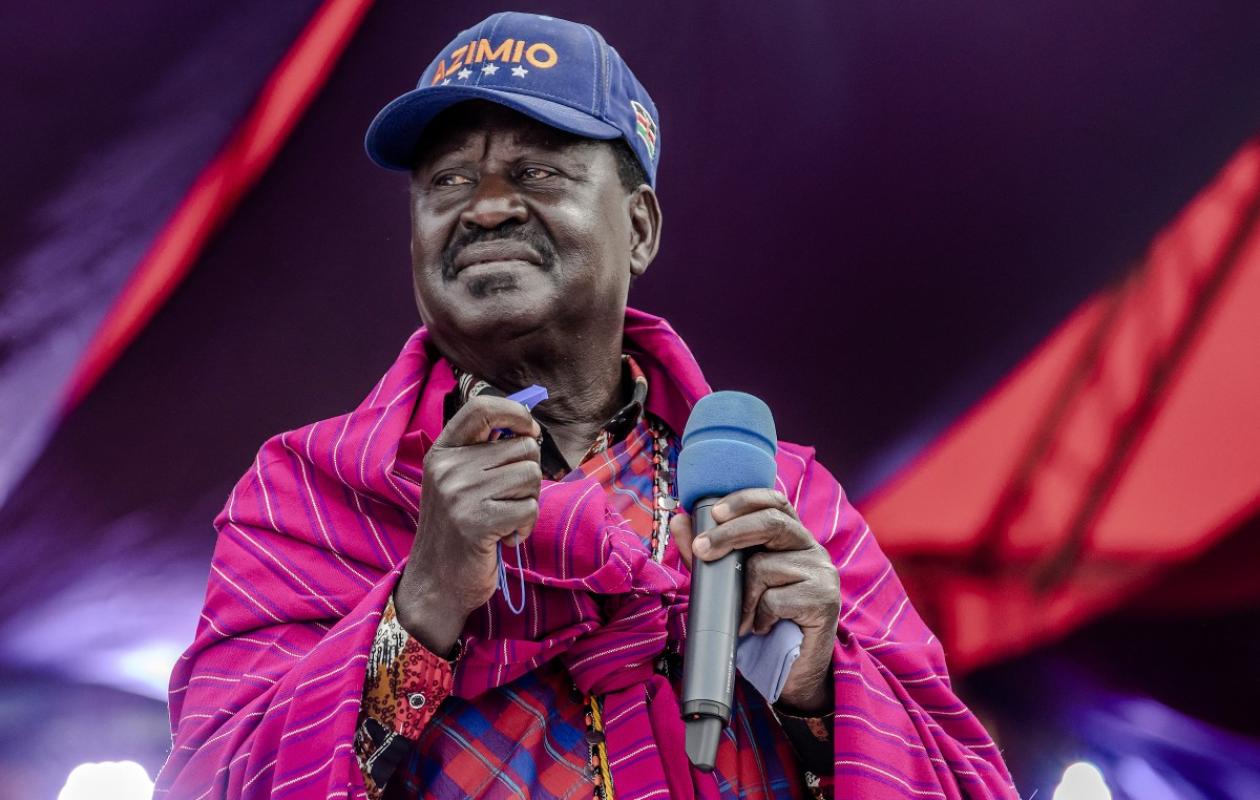
Raila Odinga, l'inusable vétéran de la politique kényane
Raila Amolo Odinga, whose death at 80 was announced Wednesday, spent most of his life in politics, including eight years in prison as a pro-democracy activist, but never managed to achieve his goal of becoming Kenya's president despite five attempts.
A member of one of the country's leading political dynasties, Odinga, a central figure in Kenyan politics, has long portrayed himself as an anti-elite agitator.
Born on January 7, 1945, he became involved in the early 1980s against the regime of autocrat Daniel arap Moi, which led to his being arbitrarily detained from 1982 to 1991. Raila Amolo Odinga then spent a brief exile in Norway, before entering Parliament in the first multi-party elections in 1992.
It was during the presidential elections of 1997, 2007, 2013 and 2017 that this leader of the Luo community established himself as a key political player, always a candidate opposed to power.
In 2007, his challenge to Mwai Kibaki's victory degenerated into bloody ethnic violence, leaving more than 1,100 dead and hundreds of thousands displaced.
The crisis was resolved by a power-sharing agreement, with Mr. Odinga as Prime Minister (2008-2013). During this period, he was one of the architects of the 2010 Constitution, considered one of the most progressive on the continent.
In 2013 and 2017, he faced Uhuru Kenyatta, with whom he has a long-standing rivalry. His father, Jaramogi Oginga Odinga, was the big loser in the power struggle after Kenya's independence in 1963, losing to the first president, Jomo Kenyatta... Uhuru's father.
In 2017, Raila Odinga had the Supreme Court invalidate the election, a first in Africa, to the fury of Uhuru Kenyatta, who had come out on top. Kenyatta was re-elected a few weeks later in a new vote boycotted by Mr. Odinga.
Challenging the legitimacy of the head of state, "RAO" symbolically invested himself as "president of the people".
But in 2018, the two rivals, after further post-election violence, decided, to everyone's surprise, on a truce, symbolized by a handshake that has become famous.
Raila Odinga's status as a perennial opponent has been tarnished. This will be further damaged after the 2022 presidential election, in which he is fiercely contesting William Ruto's victory...
Mr Ruto's popularity waned when plans for new taxes sparked mass youth protests in 2024, which were harshly repressed and left dozens dead.
The protest movement plunged Mr Ruto's government into crisis, forcing him to join forces with Mr Odinga to form a "broad-based government" last year.
In March, William Ruto signed a political cooperation agreement with his former rival – once again leaving the country without a political opposition force.
Nicknamed "Agwambo" ("the mysterious" in the Luo language), Raila Odinga is a man of contradictions.
His most loyal supporters still view him as a fighter for democracy and a vital social reformer in a deeply unequal country. His detractors describe him as a populist agitator, quick to exploit ethnic rivalries to further his ambitions.
The latter also often labeled him as a "socialist." While he may have studied engineering in Leipzig, in communist East Germany, and named his eldest son, who died in 2015, Fidel in homage to Fidel Castro, this wealthy businessman is at the head of a solid economic fortune, particularly in the ethanol and oil sectors.
Renowned for his oratory skills, his charisma has waned somewhat with age. During the campaign, this grandfather of five appeared aging, stammering, and sometimes slurred.
But he never lost his passion for the English club Arsenal, and especially for reggae.
For several years, he has made Lucky Dube's song his own, hammering out the title like a motto: "Nobody can stop reggae."
Married to Ida for nearly half a century, Raila Odinga leaves behind three children and five grandchildren.
Commentaires (1)
Participer à la Discussion
Règles de la communauté :
💡 Astuce : Utilisez des emojis depuis votre téléphone ou le module emoji ci-dessous. Cliquez sur GIF pour ajouter un GIF animé. Collez un lien X/Twitter ou TikTok pour l'afficher automatiquement.